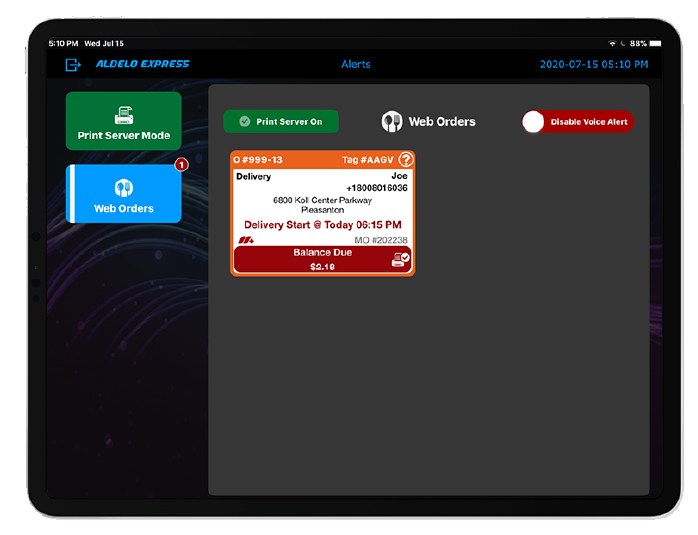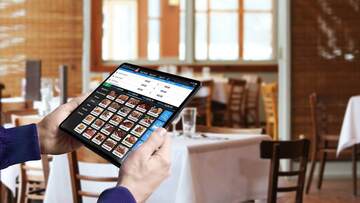5-minute read ---
Five years ago, typically only pizza places and a few full-service restaurants offered delivery of their food and drinks. Today, restaurants of all types and sizes are engaging with native and third-party delivery services to reach existing customers and expand their customer base.
Determining the best combination of native and third-party delivery platforms can be a difficult and confusing process for business owners. Do they hire additional staff to deliver items purchased through their online ordering platform, or partner with popular ordering and delivery services to increase their brand exposure?
Because each business and local market is different, there is no right or wrong answer. However, owners and operators must conduct a serious cost-benefit analysis to determine the best investment for their business. This depends on (1) what will bring the most value to the business; (2) the flexibility of the online ordering and delivery platform; (3) the cost of the program; and (4) the ease of managing the program for a single or multi-store restaurant operations.
Considerations for Third-Party Services
There are two main considerations for third-party services: cost and exposure. With millions of Americans ordering food through well-known apps and websites, promoting a restaurant’s menu on a high-traffic platform provides businesses with increased brand exposure to locals and visitors in their community.
However, sourcing customers and businesses through these integrations often come at a significant cost to both the restaurant and customers. Food, drinks, and merchandise ordered through third-party sites necessitate hosting and service fees to benefit both businesses, adding multiple additional costs for every transaction.
Fortunately, restaurant owners and operators that use Aldelo Express Cloud POS enjoy access to third-party integration partners, letting restaurants reap the benefits of these services without recurring usage or integration fees from Aldelo. A direct integration to delivery providers also eliminates the need for an additional tablet on the counter for each delivery service offered. With a direct integration, delivery orders are managed through the POS solution.
Determining the best combination of native and third-party delivery platforms can be a difficult and confusing process for business owners. Do they hire additional staff to deliver items purchased through their online ordering platform, or partner with popular ordering and delivery services to increase their brand exposure?
Because each business and local market is different, there is no right or wrong answer. However, owners and operators must conduct a serious cost-benefit analysis to determine the best investment for their business. This depends on (1) what will bring the most value to the business; (2) the flexibility of the online ordering and delivery platform; (3) the cost of the program; and (4) the ease of managing the program for a single or multi-store restaurant operations.
Considerations for Third-Party Services
There are two main considerations for third-party services: cost and exposure. With millions of Americans ordering food through well-known apps and websites, promoting a restaurant’s menu on a high-traffic platform provides businesses with increased brand exposure to locals and visitors in their community.
However, sourcing customers and businesses through these integrations often come at a significant cost to both the restaurant and customers. Food, drinks, and merchandise ordered through third-party sites necessitate hosting and service fees to benefit both businesses, adding multiple additional costs for every transaction.
Fortunately, restaurant owners and operators that use Aldelo Express Cloud POS enjoy access to third-party integration partners, letting restaurants reap the benefits of these services without recurring usage or integration fees from Aldelo. A direct integration to delivery providers also eliminates the need for an additional tablet on the counter for each delivery service offered. With a direct integration, delivery orders are managed through the POS solution.
Native Delivery Solution
Restaurants with native delivery modules built into their point-of-sale, however, eliminate third-party fees and immediately increase their revenue for delivery orders. That is why the Aldelo Express Cloud POS platform offers restaurant owners the option of utilizing a native delivery driver module with caller-ID, surcharges, digital mapping, custom digital menu pricing and more.
The Aldelo Express delivery module caller-ID feature displays customer profiles associated with the incoming phone number, streamlining phone orders as staff easily review past order history and related notes. Staff monitoring delivery orders can recall and reorder items from the customer’s history.
Once a delivery order has been received, restaurants use digital mapping and order dispatching for single and multi-driver operations, assigning their own staff to serve their customers off-site. With customizable delivery zones determined by distance and zip codes, owners limit their delivery area or set up surcharges that automatically apply to orders outside of the delivery radius, alerting staff members and requesting confirmation to continue and complete the transaction.
Owners track delivery drivers by the orders they deliver and money “dropped” between deliveries, helping monitor delivery cash flow and prevent drivers from carrying an unnecessary amount of cash on their runs.
Combined with mobile handheld POS devices, restaurants can process delivery transactions at the customer’s door. Restaurants can also accept delivery orders and payments through their Masa+ online storefront, with customers paying via their Masa+ Secure Wallet that stores personal credit cards, Gift Cards, Coupons, and Loyalty and Rewards. Customers track payments, order status, and payment redemption histories from Masa+ in real-time, providing visibility of order purchase and payment redemption histories.
The Aldelo Express Cloud POS restaurant technology platform and Masa+ suite of customer-facing solutions reflect the company’s rich POS lineage, based on 20+ years of developing point of sale software solutions. The business continually relies on its merchants to provide merchant-centric feedback and a clear understanding of the changing needs of the industry and consumers. The result is a breadth of reliable products with robust features designed for running a successful restaurant operation today, and tomorrow.
Learn more about the Aldelo Express native delivery module in the video below, or by contacting an Aldelo representative today at
[email protected] and 877-639-8767
|
Restaurants that use ultra-competitive Aldelo Pay or Aldelo Partner Merchant Services obtain access to a Centralized Multi-Store Restaurant Technology Platform that includes Masa+ Online Ordering, Unlimited Software Releases, Unlimited Software Upgrades, and 24/7 Technical Support! *** Please contact an Aldelo representative today for more details, including a free Aldelo Express POS demo trial [email protected] | 877-639-8767 | [email protected] |
|
More Like This...
|
Aldelo Referral Partners Stand Out in Major Metro Communities
with an All-Inclusive Restaurant Technology Platform 5-minute read ---
Major metropolitan communities are the best – and most challenging – places for restaurant owners. With dense working populations, multicultural communities, families, and schools, successful restaurants serve a loyal customer base with great food, reliable service, and fair prices. These businesses provide quick morning breakfasts, easy lunches to-go, after school snacks, and ready-to-eat dinner options available via dine-in, takeout, delivery, or pick-up to meet the needs of their customer base. |
Securing Your Aldelo Express Point of Sale
Using Custom POS Access and Multi-Level Security Features 6-minute read ---
Modern cloud point of sale systems are a descendant of the traditional cash register, which was created to prevent profit leakage, manage transactions, and effectively secure the business’ bottom line. Today, with the emergence of cloud-based point of sale systems, each one has its own combination of traditional, remote, and mobile services. But the primary function of a point of sale system remains the same: to effectively manage transactions and secure the business’ bottom line. |


